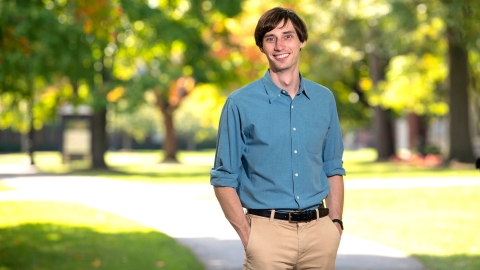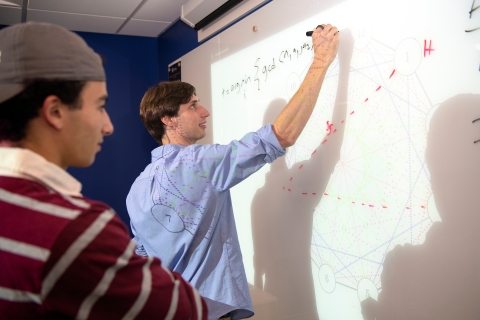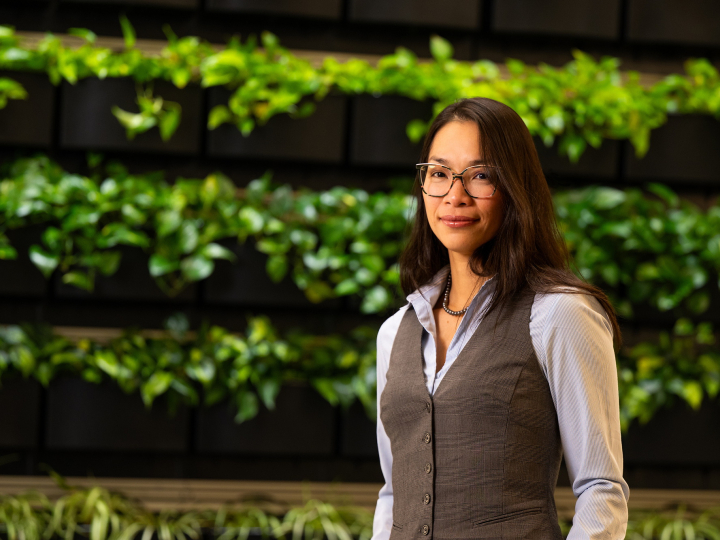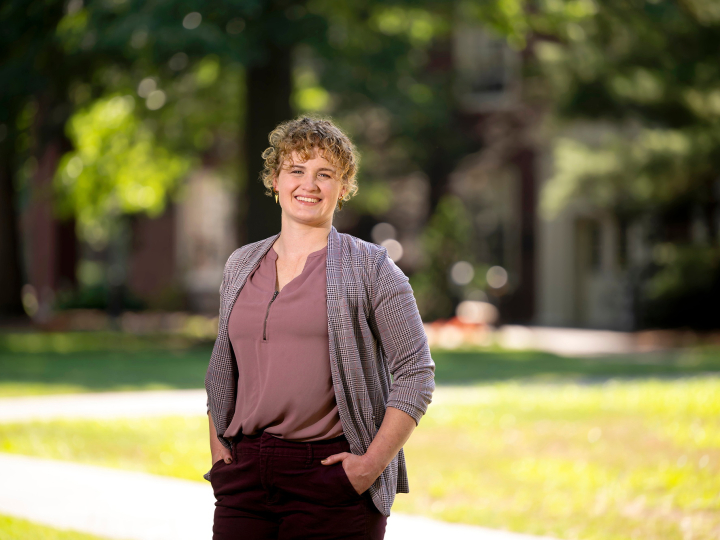
Sam Gutekunst, Mathematics and Computer Science
May 20, 2024
Sam Gutekunst, the John D. and Catherine T. MacArthur Assistant Professor of Data Science, provides students with hands-on experiences that help them understand, apply and appreciate the significance of data science. Photo by Emily Paine, Marketing & Communications
Getting students to buy into a class, getting them to buy into the content, pushing them beyond what they think they're capable of — that is what drives my work.
Professor Sam Gutekunst, the John D. and Catherine T. MacArthur Assistant Professor of Data Science, greets everyone who enters his office with the same cheerful invitation: "Would you like a Spindrift?"
Gutekunst is more than just a fan of the sparkling water — his enthusiasm and persistence led the company to recognize him as a brand influencer.
He spent five years building a relationship with the company by sharing his success of using the drink to encourage students to attend office hours, add personality to his lectures, and provide levity to the complex subjects he teaches. He eventually landed an invite to meet with Spindrift's leadership at their headquarters in Newton, Mass., which resulted in a consulting gig alongside then-student Thomas Smith '23. (It also resulted in a free subscription to Spindrift for Gutekunst, delivered to his office quarterly).
The pair helped the company understand trends in customer flavor preferences and developed data visualizations to help guide the company's decision-making. It wasn't a funded research endeavor, but Gutekunst knew the experience would offer Smith a valuable educational experience.
It's just one example of how Gutekunst goes out of his way to engage with his students and provide them with unique learning opportunities.
Comprehensive, Cross-college Influence
Gutekunst's professorship in computer science and mathematics is a unique appointment that places him in both the College of Engineering and the College of Arts & Sciences.
"My expertise is in operations research, which uses data science, math and computer science to drive decision-making," he says. "I work on developing algorithms to solve problems, using mathematics to vet what problems we can and cannot solve, and applying data science to understand everything from the finances of Broadway to forecasting NFL scores."
Gutekunst was drawn to teach at Bucknell due to the University's emphasis on the liberal arts, which encourages students to tackle complex problems by fostering critical thinking and communication skills through interdisciplinary perspectives.
Yacine Bouabida '24, a computer science and economics double-major, spent a summer working with Gutekunst on one of the most complex theoretical math/computer science problems in existence: the Traveling Salesman Problem. Recognizing the depth of the subject matter, he was initially hesitant to join the cohort. "Sam showed so much patience as I failed and failed again," Bouabida says. "I think that's the most important thing he has ever shown me — failure isn't the issue. Being afraid to bang your head against the wall a bit is." In a little over nine months, Gutekunst's mentorship helped his student researchers make some of the first new progress on an important variant of the problem in decades.

"My job is to think about a problem for months, fail 1,000 times and hope to come up with a new idea that no one's seen before," says Gutekunst (right). "I try to convey that to students; being good at something simply means being creative, looking at things from a new angle, and being willing to fail and try again." Yacine Bouabida '24 (left) and his fellow researchers learned that lesson during their work on the Traveling Salesman Problem. Photo by Emily Paine, Marketing & Communications
Gutekunst doesn't only encourage his students to tackle frustration in theoretical data science. On the opposite end of the data spectrum, he guides applied projects with massive scope that make tangible impacts.
In partnership with Bucknell's registrar, Gutekunst led a student team that helped forecast class enrollments. He then built on that work, partnering with faculty in the Freeman College of Management and the College of Arts & Sciences to restructure and refine one of the University's largest puzzles — the scheduling of final exams. "The number of possible exam schedules is enormous — far bigger than there are atoms in the known universe," says Gutekunst. "Bringing students into a project of this scope that also had a direct application to the University is what made it so exciting. Ultimately, we were able to replace an outdated, analog system with a more efficient system that saved the registrar weeks of work each semester." (Learn more about this data-science project.)
Gutekunst's goal for each project is to provide students hands-on experiences that help them understand, apply and appreciate the significance of data science.
Exceptional Instruction
In the classroom, Gutekunst's engaged and intentional approach breaks down the complexities of subjects including discrete math, statistics and algorithms, among others. His recent pedagogical research focuses on teaching complex concepts, particularly in data science. He collaborated with colleagues from his alma mater, Cornell University, to develop "Data Science and Decision Making," an online course for high school students offered by the National Education Equity Lab. This course integrates traditional data science, math, and operations research content with interactive code demos, allowing students to engage with real-world data. As part of this effort, Gutekunst contributed to the creation of GILP (Geometric Interpretation of Linear Programs), an interactive tool that helps students understand complicated algorithms by visualizing their geometric interpretation alongside algebraic operations.
Recognizing the value of student collaboration, Gutekunst also mentored students on two independent projects aimed at enhancing understanding. The first project utilized 3D design and printing to create physical models of computer science concepts, while the second project involved developing an original text explaining the theoretical underpinnings of neural networks. Gutekunst plans to incorporate these student-generated tools into his teaching at Bucknell University.
Beyond Mentorship
In Gutekunst's view, his students are more than mentees — they are his partners and colleagues. "Bucknell students are incredibly smart and capable," he says. "I aim to teach them to be willing to fail and to realize that productive failure is good. It means you are pushing yourself; that you're striving."
During office hours, where giant boxes of goldfish, five-pound bags of gummy bears and copious amounts of Spindrift serve as brain food, students explore not only the coursework Gutekunst assigns but also the full scope of data science. They have sought mentorship to build a programmable guitar pedal, asked to collaborate on research after graduating, and brought their desire to delve into professional sports analytics to Gutekunst.
In nearly every instance, he responds with a resounding, "Yes, when would you like to get started?"
"I love my research and thinking about really big problems," he says. "But mentoring students — helping them see what they're capable of — that's what I love about being a professor."

